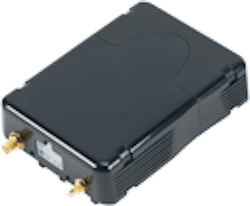Fleets, insurance companies, and OEMs alike are getting on the “black box” bandwagon, increasingly viewing such devices as a way to lower costs, improve vehicle performance, and most importantly proactively reign in potentially harmful driving habits before they lead to accidents.
“These systems allow us to ‘score’ commercial drivers, to determine with concrete evidence those that are good and those that need training, then correlate that information back to insurance rates to get discounts,” Mike Slattery, spokesperson for Liberty Mutual Agency Markets, told FleetOwner.
Slattery said Liberty Mutual is rolling out on a nationwide basis a new system called Onboard Advisor to monitor the driving behavior of commercial vehicle operators in relation to conditions such as traffic flow and weather. Vehicle performance data is combined with roadway information gleaned from GE Security’s NavLogix GPS technology not only to record vehicle speed, braking and corning maneuvers, but also to overlay Google street maps with second-by-second detail.
Fleets that install Onboard Advisor can realize savings on commercial auto premiums of up to 15% in the first year and up to 40% based on fleet performance upon coverage renewal though most of Liberty’s eight regional companies, such as Golden Eagle Insurance, Liberty Northwest, and Ohio Casualty, the company said.
“The more we know about fleets – the more that we can determine those that are really good, backed up with data – the more money we all can save,” Slattery said.
Many fleets are pushing for the introduction of black box technology, largely as a way to spot problem areas before they blow up into bigger issues.
Bob Neitzel, vocational marketing manager for fire, emergency, and government vehicles at Navistar, said the impetus for his company to offer an optional factory-installed black box on WorkStar and DuraStar fire and rescue truck models came directly from the fire fleets themselves.
“The National Fire Protection Association (NFPA) spent three years developing data recorder standards because the fire chiefs wanted two things: a way to make sure their people were doing the right things behind the wheel and a way to defend them as well,” Neitzel told FleetOwner.
He stressed that Navistar’s data recorder option for the fire and rescue market isn’t a black box per se – it’s data sampling rates are deliberately slowed down so such information cannot be used in accident reconstruction efforts. However, the devices do provide key pieces of information in terms of driver and vehicle performance: were the seat belts fastened, were the sirens and emergency lights activated, vehicle speed, plus hard acceleration and braking events.
“That information tells a chief what kind of drivers are behind the wheel and if they are following proper procedures,” Neitzel explained. “For a poor driver – one that ignores the rules and speeds – this device won’t help them out. But for a good driver, it’ll defend them. In one accident in California, a motorist claimed the fire truck was speeding without its lights on. The data recorder showed it was going 35 mph with its lights on – data that bailed them out of a lawsuit.”
The key with black box data, however, is that it can cut two ways – both to defend and incriminate a fleet, Darry Stuart, president of DWS Fleet Management, told FleetOwner. But if the technology is priced reasonably, fleets should still consider installing it on their vehicles.
“Frankly, it’s the lack of information – good or bad – that leaves a fleet more exposed,” explained Stuart, who’s served as a expert witness in court on cases dealing with black box data. “Make no mistake – such data can be crucifying. But you have a better chance of defending yourself against information that you know, versus information from a third party that’s unknown,” he said.
Yet that also means if fleets decide to adopt the black box, they must be willing to make it an integral, ongoing part of their day-to-day operation or risk losing missing opportunities for improvement, added Richard Clepper, president of the Clepper Consulting Group.
“If the box data isn’t reviewed regularly -- weekly or bi-weekly -- carriers will lose the opportunity to spot problems and take proactive steps to retrain and ‘redirect’ employees,” Clepper told FleetOwner. “The data inside the black boxes has to be interpreted by the right people at the right time for the carriers to get the best return on both their IT [information technology] and human capital investments.”
At the end of the day, it’s all about allowing fleet managers to take a more active and immediate role in risk management, said Thomas Troy, executive vp and COO of Liberty’s regional companies group. “It puts a fleet manager in the driver’s seat of every vehicle with daily, bi-weekly, and monthly performance tracking. It’s a great coaching tool for improving and rewarding safe driving.”
About the Author
Sean Kilcarr
Editor in Chief
Sean Kilcarr is a former longtime FleetOwner senior editor who wrote for the publication from 2000 to 2018. He served as editor-in-chief from 2017 to 2018.
